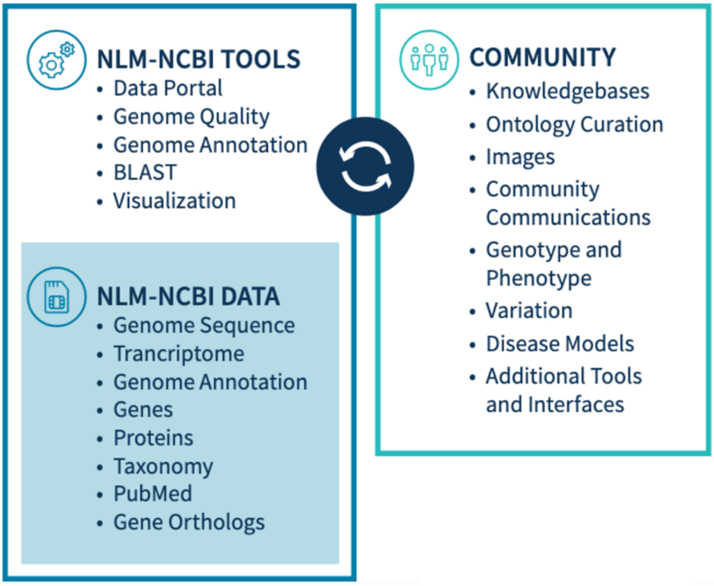By Kristi Holmes, PhD, Director, Galter Library & Chair, CGR Working Group
 The National Institutes of Health (NIH) Comparative Genomics Resource (CGR) is a National Library of Medicine (NLM) project to maximize the biomedical impact of eukaryotic research organisms and their genomic data. NIH charged the National Center of Biotechnology Information (NCBI) at NLM to lead this trans-NIH funded project and establish an ecosystem that facilitates reliable comparative genomics analyses for all eukaryotic organisms. This ecosystem will feature a centralized suite of NCBI repositories and knowledgebases enhanced with community supplied content and primed for compatibility with organism resources external to NCBI. CGR is also providing public tools to promote high-quality eukaryotic genomic data submission to GenBank to build the core genomic foundation needed to support reliable comparative analyses of eukaryotic research organisms. Examples of CGR benefits include:
The National Institutes of Health (NIH) Comparative Genomics Resource (CGR) is a National Library of Medicine (NLM) project to maximize the biomedical impact of eukaryotic research organisms and their genomic data. NIH charged the National Center of Biotechnology Information (NCBI) at NLM to lead this trans-NIH funded project and establish an ecosystem that facilitates reliable comparative genomics analyses for all eukaryotic organisms. This ecosystem will feature a centralized suite of NCBI repositories and knowledgebases enhanced with community supplied content and primed for compatibility with organism resources external to NCBI. CGR is also providing public tools to promote high-quality eukaryotic genomic data submission to GenBank to build the core genomic foundation needed to support reliable comparative analyses of eukaryotic research organisms. Examples of CGR benefits include:
- High Quality Genomic Data: Newly accessible and improved NCBI tools will provide the genomics community with a core foundation of uncontaminated and consistently annotated eukaryotic genomes.
- Data Standardization: By implementing FAIR standards (Findable, Accessible, Interoperable, Reusable), NCBI genome-associated data can be searched, browsed, and downloaded seamlessly. NCBI data can also be used with a range of standard bioinformatics platforms and tools.
- New and Improved Comparative Genomics Tools: In addition to tools promoting high-quality genomic data, NCBI will enhance existing tools and develop new ones to improve and simplify comparative analyses.
- Seamless User Experience: NCBI will offer new and improved web and programmatic interfaces that facilitate discovery, analysis, and delivery of eukaryotic genomic-related content.
- Discovery Amplification: By providing equal access to genomic data and tools for all eukaryotic research organisms—including those not represented by organism-specific resources—and improving the connectivity of their data, NCBI is increasing their potential contributions to research. CGR will enhance NCBI-held content with community supplied content, and connect NCBI resources with community-provided resources, to amplify the impact of such data and resources in support of greater scientific discovery.
- Scalable Analyses: NCBI is developing content and tools to support emerging big data approaches to comparative genomics analyses, such as facilitating the creation of Artificial Intelligence (AI)-ready datasets and cloud-ready tools. This will meet new research needs and accommodate anticipated data growth.
How can you get involved?
Community collaboration is critical to CGR project success. Feedback from the genomics community will inform improvements made to existing NCBI data, tools, and interfaces and help guide new developments in these areas. The CGR team engages with the scientific community through meetings, workshops, webinars, surveys, small group sessions, user testing, and interviews. Let the CGR team know what you need to support your comparative genomics analyses and give direct feedback on CGR at cgr@nlm.nih.gov or click the yellow Feedback button on the bottom right of the CGR page.
Check out the CGR project for ongoing updates and to learn more about the data resources and tools for the eukaryotic research organism community. Follow CGR on Twitter (#NCBICGR), Facebook, GitHub, Insights news, and subscribe to the CGR mailing list for CGR news and for new opportunities to get involved. The CGR team is excited to hear from you!
Updated: December 13, 2022